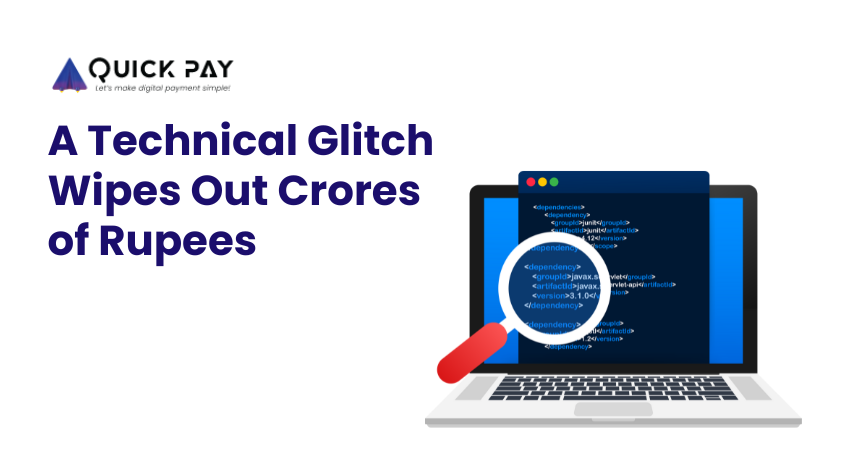Your Go-To Payment Gateway for Financial Businesses in India
In today's fast-paced digital world, businesses, especially those in the financial sector, need a payment solution that's not just fast and secure, but also intelligent and reliable. That's where a payment gateway like QuickPay comes in. It's more than just a tool; it's the backbone of your digital transactions, ensuring smooth and secure payments for your customers.
What Exactly is a Payment Gateway?
Think of a payment gateway as the secure bridge connecting your customers, your business, and the financial institutions involved in a transaction. When a customer pays you online or in person, the payment gateway is the unseen force working behind the scenes.
Here's a quick look at its key functions:
- Collecting Payment Information: It securely gathers details like credit/debit card numbers or digital wallet credentials.
- Encrypting Sensitive Data: Your customers' financial information is immediately encrypted, transforming it into an unreadable format to protect it from cybercriminals.
- Authorizing Transactions: It communicates with the banks to verify and approve or decline the payment.
- Communicating Transaction Status: You and your customer instantly know if a payment was successful or not.
- Fraud Detection: Many gateways, including QuickPay, come equipped with powerful tools to spot and prevent fraudulent activities.
Payment gateways are everywhere – from your favorite online store to physical shops using POS terminals, and even within mobile apps for in-app purchases. They are crucial for any business looking to accept electronic payments safely and efficiently.
How Does a Payment Gateway Protect Your Online Payment Information?
The security of your payment information online is paramount, and payment gateways employ multiple layers of protection to ensure this. QuickPay, for instance, uses a combination of advanced technologies and industry best practices:
- Data Encryption: As soon as you enter your payment details, they're encrypted using protocols like SSL (Secure Socket Layer) or TLS (Transport Layer Security). This makes your data unreadable during transmission, even if intercepted.
- Tokenization: Instead of storing or transmitting your actual card details, the gateway replaces them with unique, randomly generated "tokens." These tokens are useless to hackers, providing an extra layer of security.
- Multi-Factor Authentication (MFA) and 3D Secure: Many gateways require additional verification steps, like one-time passwords (OTPs) or biometric scans, or use 3D Secure authentication to confirm your identity during checkout.
- PCI DSS Compliance: Reputable gateways strictly adhere to the Payment Card Industry Data Security Standard (PCI DSS). This standard outlines stringent requirements for handling and storing cardholder data securely, ensuring regular security audits and encrypted access.
- Fraud Detection and Monitoring: Modern gateways use real-time monitoring, machine learning, and other tools to detect suspicious or fraudulent activity. If a potential threat is detected, the transaction can be blocked or flagged for review.
- Secure Infrastructure: Gateways operate on secure, regularly updated servers, with ongoing security audits to identify and patch any weaknesses.
| Security Feature | How It Protects You |
| Data Encryption | Makes your payment info unreadable during transmission |
| Tokenization | Replaces card data with random tokens, useless if stolen |
| MFA/3D Secure | Adds extra verification steps to prevent unauthorized use |
| PCI DSS Compliance | Enforces strict standards for handling cardholder data |
| Fraud Detection | Monitors and blocks suspicious transactions in real time |
| Secure Infrastructure | Uses secure servers and regular updates to prevent breaches |
The Indispensable Role of Payment Gateways in the Financial Sector
Payment gateways are absolutely essential in the financial sector, especially for fintech companies. They enable secure, efficient, and scalable electronic transactions across a wide range of applications.
Here's how they benefit the financial industry:
- Secure Transaction Processing: They use encryption, tokenization, and multi-factor authentication to protect sensitive financial data, significantly reducing the risk of fraud and data breaches.
- Regulatory Compliance: Gateways help financial institutions meet evolving regulatory requirements, such as PCI DSS and PSD2, ensuring privacy and legal compliance in payment processing.
- Streamlined Operations and Automation: By automating payment authorization, settlement, and reconciliation, they reduce manual effort and errors, speeding up processes.
- Enhanced Customer Experience: They support diverse payment methods (cards, wallets, UPI), currencies, and integration options, making transactions convenient for customers.
- Scalability and Global Reach: As financial services grow, payment gateways can handle increasing transaction volumes and facilitate international payments.
- Real-Time Analytics and Insights: They provide real-time transaction data and reporting, helping financial institutions monitor performance and optimize operations.
- Fraud Detection and Risk Management: Advanced gateways use AI and machine learning to identify and block suspicious transactions, protecting both businesses and customers.
- Cost Efficiency: By automating processes and offering competitive transaction fees, they help reduce operational costs.
Where are Payment Gateways Used in the Financial Sector?
- Banks and NBFCs: For online and mobile banking payments, loan disbursals, and EMI collections.
- Fintech Platforms: Powering digital wallets, peer-to-peer transfers, investment apps, and neobanking services.
- E-Governance: For secure government payments, tax collections, and subsidies.
- E-Commerce and Online Retail: Enabling businesses to accept various payment methods.
- Mobile Payments and Contactless Transactions: Supporting payments via mobile wallets, NFC, and QR codes.
- Subscription and Recurring Billing Services: Automating recurring payments like insurance premiums and loan EMIs.
- Payment Aggregators and Marketplaces: Providing a unified platform for multiple merchants.
- International and Cross-Border Payments: Facilitating multi-currency transactions for global businesses.
- Analytics and Reconciliation: Offering real-time transaction data and reports for financial management.
| Sector/Use Case | Example Activities Enabled by Payment Gateway |
| Banks & Financial Institutions | Online payments, fund transfers, bill payments |
| Fintech Companies | Digital wallets, P2P apps, lending, investments |
| E-Governance/Government | Tax, utility bill payments, subsidies |
| E-Commerce/Online Retail | Card, UPI, wallet, net banking payments |
| Mobile & Contactless Payments | NFC, QR, mobile wallet, in-app transactions |
| Subscription/Recurring Billing | EMIs, insurance premiums, SaaS subscriptions |
| Payment Aggregators/Marketplaces | Multi-merchant payments, analytics, fraud detection |
| International/Cross-Border Payments | Multi-currency, global transactions, remittances |
| Analytics & Reconciliation | Real-time reporting, reconciliation, compliance |
How Payment Gateways Bolster Fraud Detection and Security Compliance
Payment gateways are critical allies in the fight against fraud and in maintaining stringent security compliance. They integrate advanced technologies and regulatory standards to safeguard the payment process.
Here's how they help with fraud detection:
- Address Verification Service (AVS): Checks if the billing address matches the one on file with the card issuer.
- Card Verification Value (CVV): Requires the CVV number, ensuring the card is physically present.
- Device Intelligence & Device ID: Analyzes device characteristics to spot unusual behavior or repeated fraud attempts.
- IP and Geolocation Analysis: Monitors IP addresses for risks like VPNs or logins from high-risk countries.
- Flagging Large or Unusual Transactions: Automatically identifies and flags high-value or abnormal transactions.
- Payer Authentication (e.g., 3D Secure): Adds multi-factor authentication steps during checkout.
- Real-Time Transaction Monitoring: Continuously monitors transaction patterns to detect and block high-risk transactions.
- Digital Footprint & Email Analysis: Checks for behavioral and identity signals (like social media presence or email age) to distinguish legitimate users from fraudsters.
And for security compliance:
- PCI DSS Compliance: Adherence to strict protocols for storing, processing, and transmitting cardholder data.
- Regulatory Technology (RegTech): Automates compliance with financial regulations, including audit trails and reporting.
- Integration of Fraud Prevention APIs: Securing the entire transaction process, not just the payment step.
- Adaptive Authentication: Applies more stringent verification for high-risk transactions.
The outcome? Reduced chargebacks, increased customer trust, and enhanced operational efficiency.
The Power of Real-Time Digital Footprint Analysis in Fraud Detection
Real-time digital footprint analysis is a game-changer for fraud detection. It leverages a user's online behavior, device data, and digital identity signals to quickly and accurately identify suspicious activity before fraud even occurs.
Here's how it works:
- Comprehensive Data Collection: Real-time systems gather a wide array of data points, including device information, IP addresses, email and phone number histories, social media activity, and behavioral patterns.
- Pattern Recognition and Anomaly Detection: By analyzing typical user behavior, these systems can instantly spot deviations—like sudden spending spikes, use of temporary emails, or logins from unusual locations—all red flags for fraud.
- Behavioral Biometrics: This advanced analysis monitors subtle user behaviors, like typing speed and mouse movements, making it much harder for automated attacks to succeed.
- Risk Scoring in Real Time: Each transaction is assigned a risk score. High-risk scores can trigger additional verification or block transactions automatically.
- Cross-Checking Digital Identities: It verifies the consistency of digital identities by checking if credentials are linked to genuine online activity or have suspicious histories.
- Integration with AML and Compliance Systems: Digital footprint analysis can be integrated with anti-money laundering (AML) and compliance tools for a holistic approach.
This proactive, data-driven approach significantly raises the barrier for fraudsters and enhances overall security without adding unnecessary friction for legitimate users.
QuickPay: The Smart Choice for Your Financial Business in India
QuickPay (usequickpay.com) stands out as a powerful and reliable payment gateway for the financial industry in India. It's designed to make your digital payment processes secure, automated, and scalable.
Here's a look at QuickPay's key features and how they benefit you:
- Multi-Channel Payment Acceptance: QuickPay supports a vast array of payment methods including debit/credit cards, net banking, UPI, and various digital wallets. It even offers dynamic QR codes and payment links for easy collections, even without a website.
- Top-Tier Security and Compliance:
- Advanced Fraud Prevention: QuickPay employs intelligent fraud detection technologies, multi-factor authentication, and real-time monitoring to safeguard your transactions.
- PCI DSS v4.0.1 Compliant: This means QuickPay adheres to the highest industry standards for data security, giving you peace of mind.
- SSL Encryption: Your sensitive payment data is protected during transmission through robust SSL encryption.
- Seamless Integration and Automation:
- Easy Integration: No complex coding required! QuickPay can be set up in minutes and seamlessly integrated with your existing CRM/ERP systems or business applications.
- Automated Processes: It supports recurring payments, subscription billing, and instant payment receipts, significantly reducing your manual workload and boosting efficiency.
- Operational Efficiency and Scalability:
- Real-Time Reporting: Get detailed analytics on all your transactions, refunds, payment failures, and account summaries, empowering you with crucial financial insights.
- Direct Bank Integrations and Intelligent Routing: QuickPay's direct integrations and smart routing maximize payment success rates and reliability, which is vital for high-volume financial operations.
- Business Growth and Flexibility:
- Custom-Branded Payment Pages: Maintain your brand consistency with custom-branded payment pages, enhancing your professional image.
- International Payments: Accept both domestic and foreign payments, opening up new avenues for cross-border transactions and global expansion.
- Specialized Use Cases: QuickPay also offers solutions for specific sectors, such as automating fee collections for educational institutions or providing cost-effective digital payment solutions for small businesses and startups.
What Makes QuickPay’s Payment Routing "Smarter"?
QuickPay's payment routing isn't just good; it's genuinely smarter than many other payment gateways in India. This intelligence directly translates into higher transaction success rates, better cost efficiency, and a smoother user experience.
Here's why QuickPay stands out:
- Dynamic, Intelligent Routing: QuickPay evaluates each transaction in real time. It considers factors like card type, issuing bank, currency, amount, and even device or location, to select the optimal payment processor or acquiring bank. The goal? The highest approval probability and the lowest cost.
- Failover and Retry Logic: If a transaction hits a snag with one processor, QuickPay doesn't give up. It instantly reroutes the payment through an alternative path, dramatically reducing declines and payment drop-offs.
- Customization and Business Alignment: Unlike generic gateways, QuickPay tailors its routing logic to fit your specific business needs, industry, and risk profile. This ensures maximum performance whether you're a startup, an SME, or a large enterprise.
- Real-Time Analytics and Insights: QuickPay's dashboard provides instant visibility into transaction performance, failure causes, and customer behavior. This allows you to quickly adapt your routing strategies for even better outcomes.
- Multi-Layered Security and Compliance: Transactions are routed through the safest path, factoring in fraud risk and compliance requirements (like PCI-DSS), which is especially crucial for high-risk and high-volume industries.
- Lightning-Fast Integration and Support: QuickPay offers developer-friendly APIs and SDKs for rapid deployment, allowing you to go live in hours. Plus, their 24/7 expert support ensures any routing issues are resolved instantly, minimizing downtime and lost revenue.
How QuickPay’s Intelligent Routing Reduces Transaction Failures in India
QuickPay's intelligent routing is a powerful tool in minimizing transaction failures in India. It works by constantly analyzing transaction variables and network conditions, then instantly rerouting payments when issues arise. This leads to significantly higher approval rates and a more reliable payment experience.
Here's how this intelligent approach makes a difference:
- Real-Time Processor Selection: For every transaction, QuickPay's routing engine evaluates multiple factors to determine which acquiring bank or payment processor is most likely to approve the payment.
- Automatic Failover and Retry: If a transaction fails with one processor due to a technical issue or temporary downtime, QuickPay immediately reroutes the payment through an alternative, ensuring fewer failed transactions.
- Adaptive to Bank and Network Performance: The system continuously monitors the health and success rates of different banks and processors. If one is experiencing slowdowns or high failure rates, QuickPay automatically avoids it, directing payments to more reliable channels.
- Machine Learning and Data-Driven Optimization: Over time, QuickPay's routing engine learns from historical transaction data, identifying patterns in approval rates and optimizing future routing decisions for even higher success rates.
- Reduced Customer Drop-Offs: By minimizing failed transactions and providing instant retries, QuickPay ensures a smoother checkout experience, which in turn reduces customer frustration and cart abandonment.
In essence, QuickPay’s intelligent routing is your secret weapon for ensuring a seamless, secure, and highly successful payment experience for your financial business in India.
Ready to experience the difference a smart and secure payment gateway can make for your financial business? Explore QuickPay's solutions today!















